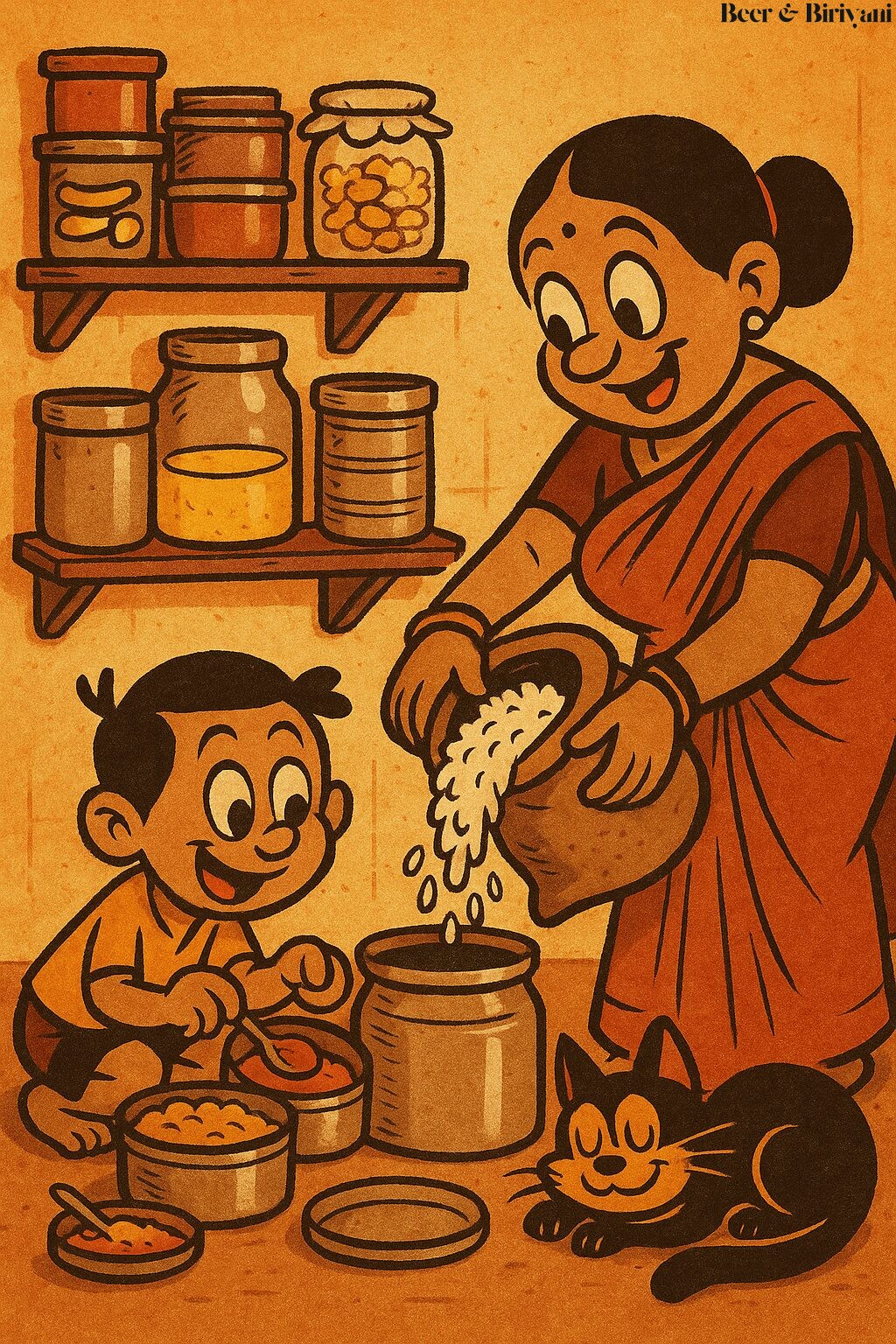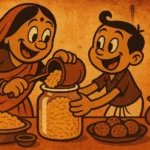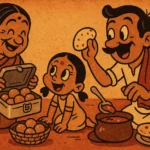In my childhood kitchen in Mumbai, there were no empty containers. Only ones waiting to be refilled. The rice tin, the atta dabba, the one with sugar (always slightly sticky near the lid)—each existed in a kind of humble rotation. When it emptied, it wasn’t discarded. It was quietly refilled. And this simple act, repeated week after week, year after year, turned food from an event into a rhythm. A loop. Never really beginning or ending—just continuing.
We didn’t call it sustainability. We just called it “Thursday morning.”
The Dabba as Philosophy
Indian kitchens aren’t designed for single-use anything. We’re not a grab-and-go culture. We’re a refill-and-repeat one. Our steel dabbas are round, stackable, and designed to last decades. You don’t throw away a dabba. You don’t replace it because the color faded. In fact, the older it is, the more reliable it becomes. Some even develop personalities. “The dal dabba.” “The pickle one with the tight lid.” “The ghee dabba that smells like Diwali.”
And every few days, without fanfare, my mother would open the big container in the corner of the storeroom and refill them all. Rice first. Then lentils. Then flour. She never made a show of it, but you could tell it gave her quiet satisfaction—keeping the cycle going. Keeping the home fed without pause or panic. Like the domestic equivalent of tending a sacred fire.
Food as a Loop
Western food logic often moves in lines. Meal prep. Grocery list. Cook. Eat. Throw. Repeat. Indian kitchens move in circles. The tadka pan is wiped, not scrubbed. Leftover sabzi becomes stuffing the next day. Extra rotis are dried and powdered for laddoos. Even the tea leaves from morning chai are sometimes repurposed into a garden remedy your grandmother swears by.
Nothing is “done.” It’s just “not yet needed.” The fridge isn’t a cold end point. It’s a halfway house. That sense of continuity turns food from a task into a relationship. You don’t cook to finish. You cook to maintain.
The Unsung Refill Ritual
Growing up, I used to think the most magical part of the kitchen was the cooking. The clanging, the sizzling, the aromas. But I’ve come to appreciate the quieter moment that happens before all that—the refilling. Watching my mother tip a huge tin of basmati into a smaller steel dabba, tap it to settle the grains, and close it with a firm twist of her wrist. It looked ordinary, but it was everything. It was preparation. Insurance. Love in practical form.
Even now, in Austin, I have a small shelf of dabbas. Not as elegant. Some are plastic. One used to be a cookie tin. But they still get refilled. Rice, toor dal, besan. On weekends, I open each one, peek inside, top it up. Not because I’m out. Just because it’s time. The loop must continue.
The Emotional Shelf Life
The dabba system also holds emotional intelligence. You never run out dramatically. You notice the slow decline. The sound of fewer grains, the lighter feel in your hand, the hollower echo when you scoop. That’s your signal. Time to refill. Time to remember that feeding a home isn’t just about what’s cooked today—it’s about what’s quietly made ready for tomorrow.
And refilling isn’t about abundance. It’s about presence. You refill not because you’re out of food, but because you’re in tune with it. You respect its cycle. Its place. Its role as something living in your home, not just something you consume and discard.
Containers With Memory
Our dabbas age with us. The flour tin that once held five kilos now gets refilled with two. The sugar container from your college hostel still smells faintly of spilled tea. The ghee tin that traveled in your check-in luggage, wrapped in three layers of newspaper, survived two countries and five airport scans—and still clicks shut with that reassuring sound that says, “home.”
You can’t say that about ziplocks.
Loops That Last
There’s something quietly powerful about designing life around loops. Not just for food, but for thought. For rest. For relationships. The idea that care is not a performance, but a pattern. That sustenance is less about occasional bounty and more about consistent attention.
So yes, the dabba gets refilled. Again and again. Without applause. Without Instagram. Just quietly, like breath. Like care. Like all things that matter most—not grand gestures, but small loops that hold us in place.
Born in Mumbai, now stir-frying feelings in Texas. Writes about food, memory, and the messy magic in between — mostly to stay hungry, sometimes just to stay sane.












